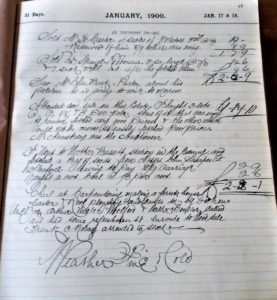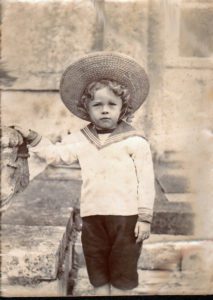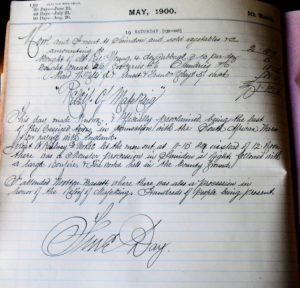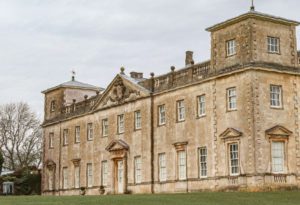The Elliot Woolford diaries – 1900
The turning of the year and the beginning of a new century appear to have made little impact on the establishment at Hook Farm where life and work continued as usual.
Monday January 1, 1900 – I went to Winterbourne Bassett and fetched four sacks of potatoes which we bought last week of Mr George Lovelock @ 8/- per sack. Bought a weaned off calf of Mr Samuel Lewis for £3 3/- Expences 1/- Rowl and the Carter ploughing for Swedes Charl at odd work. Weather Fine day very wet night.
The three Woolford brothers Charl aged 43, Elliot 33 and 27 year old Rowl had a heavy workload. They moved to Hook Farm on the Lydiard estate in 1899 with their elder sister Ellen, but continued to work at their former home, Bagbury Farm in Purton and the family home at Dogridge, Purton.
In 1900 the workforce at Hook Farm comprised the Carter, William Mills and the two young brothers Frank and Ernest Mobey aged 15 and 13. Casual labour was employed at busy times during the agricultural year. But no matter how hard or how long he worked, Elliot made a regular daily entry in his diary, recording all the tasks undertaken that day. Every expense, everything bought and sold, is accounted for and at the end of the year the monthly finances are reckoned up – total expenditure £731 10s 10d total income £723 7s 11d in 1900. It was a hard life.
And Elliot faced his own personal challenges during 1900 when a local woman named him as the father of her new born daughter.
He writes:
Charl & I went to Swindon and met Miss D.R. Cove with respect to an illegitimate child “female” which she alleges me to be the Father. She has been living with Mr E. Plummer Lydiard whose moral character is anything but good. I signed an agreement to pay 3/- per week to be paid quarterly. I was served with a summons to appear on Saturday next but to save a scandal & talk I agreed to pay. I paid £1 2/6 for Lawyers Expences & Stamping & Paid Miss Cove £1 11 Confinement Exp.
We learn about life on the Lydiard estate then run by the recently widowed Lady Bolingbroke and her cousin Edward Hiscock. Elliot mentions events at Lydiard Park and outings with the two teenage St John brothers and even visits to the young ‘lord’.
Rowl and I went to Church in the Evening after which we went into Lady Bolingbrokes saw her son “Vernon” boy 4 yrs had supper and sung hymns till 12 o’clock Vernie would have Rowl to put him to bed.
Then in the autumn of 1900 the Woolford brothers responded when a neighbour was struck by not just one, but two tragedies.
Wednesday October 3 – Rowl went over to Purton and called at Mr James Sadlers as we are getting up a subscription for Mr Norman Hitchcock who has had a fire, and lost his wife and is left with 11 children he gave £1 Mrs Kittoe 10/- and Mr Robson 5/- he is to Mr H. Whites and Mr Kinchins this evening.
Throughout the months of October and November the three brothers continued to canvas for donations and on November 30 Elliot recorded in his diary:
Gave Mr Norman Hitchcock “Baker Hook” Cheque £20 10/- which we collected from friends & neighbours on his behalf owing to a fire at his house and the loss of his wife immediately afterwards leaving him with a family of 11 children.
And along with the ordinary and everyday happenings in Hook, Elliot records the big events on the national front.
On Saturday May 19 he went to Swindon market as was his usual habit but then he writes:
“Releif of Mafeking”
This day made known & officially proclaimed being the last of the Beseiged town in connection with the South African War now raging with England.
Great W Railway Co Works let the men out at 11.15 A.M. instead of 12 Noon there was a Monster procession in Swindon at Night followed with a large Bonfire & Fire Works held in the County Ground.
I attended Wootton Bassett where there was also a procession in honor of the Relief of Mafeking. Hundreds of people being present.
The Woolford diaries are much more than an account of just one farming family in a small Wiltshire village, but a snapshot of society and the changing times and challenges of a different age and a new century.
See more of the Elliot Woolford diary at the Lydiard Archives.



